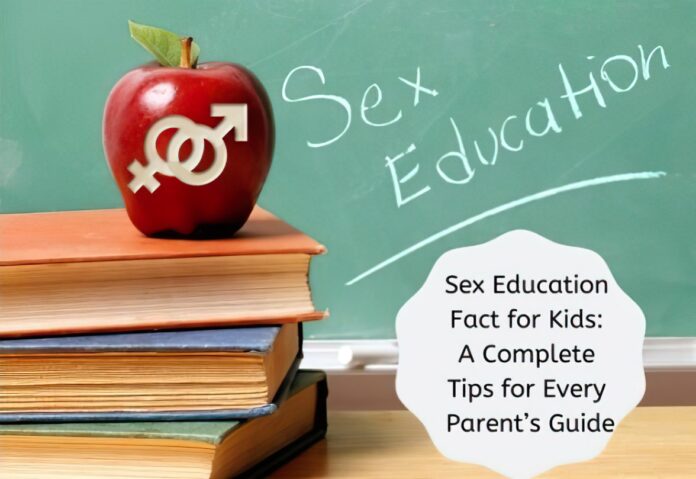Sex Education Facts for Kids: A Complete Tips for Every Parent’s Guide
Sex Education Facts for Kids: A Complete Tips for Every Parent’s Guide: If you are searching for sex education facts for kids on the internet then you are in the right place because, in this article, we will discuss your entire query related to sex education for kids. We have a guide to help you understand what you can say to your child at what age so that your kids can make healthy sexual choices.
Don’t wait for children to ask about sex, initiate the talk yourself
I don’t think we should wait for children to ask about sex before we should start talking about it. I think parent-teacher schools should be aware of sex education and how to impart it. And particularly in today’s day and age. I think it is an essential life skill that must be given to them and tell kids that sex education is not only about sex.
Stage 1 – 4 to 5 years old
1. Talk about body parts

Do not use terms that make children feel ashamed of their bodies
It’s about various things we believe that sex education should start as early as a maybe child is four or five years old and at that time the focus is on becoming aware of their bodies and their private parts so that they are comfortable with it without using derogatory terms such as Mamie sue-sue or chichi which puts a negative connotation and they begin to feel ashamed or embarrassed about their bodies right?
Make them aware of and comfortable with their bodies
We should spread awareness about their body parts and don’t be suddenly shy when it comes to naming them like that’s your nose, that’s your tummy and that’s your penis and vagina etc. So teach them that boys and girls can have different private parts. Then teach them about which body parts are private parts and tell them no one can allow to touch them ask your kids not to touch their and anybody’s private parts because young children don’t have a sense of privacy so they may touch themselves in public. You don’t have to scold them about it. So teach instead of scold
2. Outline Safety Rules:
Identify who they can approach with a problem
And then of course the next issue we need to talk about is safety as to who can you for instance change in front of who can give you a bath who can take you to the toilet and who are the people you can trust when you have to go with any kind of discount for the questions about it. So those are the kinds of things that we can talk about in the young a lot.
List who children can trust for different tasks
You should guide our kids so that they can only listen to their parents, teachers, and relatives. And not any strange person with whom they are not familiar.
Give a healthy counterpoint to material in media may be damaging
we need to reinforce some of these things in different spaces both at home and in school material that you find out there in the media which can be very damaging so it’s very important to help give them a healthy view of it.
Define boundaries for friendships with older people
All about and again the safety issue and particularly about the abuse the fact that when you have friendships or when you older people befriend you. There may be boundaries that you have to tell and aware your children about it. And while respecting elders is good you also have to tell them to shout and scream if that elder hurts them. And teach them to say no like it’s okay to say no to shaking hands, kissing, or hugging because you are the boss of your body and nobody is allowed to touch them inappropriately.
Define indicators of abuse or discomfort where they should raise an alarm
There are you know indicators that children need to know about where they will raise an alarm do you know so those are the kinds of things that they need to talk about right
Answer questions sensitively, and genuinely, without being embarrassed or evasive
They may have lots of questions also about how are babies made and you know how do girl’s private parts look like and what a boy’s private parts look like so on and on. So first these questions also have to be answered sensitively and genuinely without again being very embarrassed or you know evading the issue.
Stage II– 8 to 10 years
Be prepared to answer more questions about physical changes, relationships, attraction, and how babies are born

So the next phase when talking about sex becomes important is between the ages of eight to ten and this is the time when some of the progressive schools start having grown-up or sex education workshops and classes I think it’s a very good time because this is the time when children are beginning to have questions in our questions about how their life.
Help them understand how to manage changes in their bodies
Bodies might change about relationships about attraction about you know looking at some of their older cousins or siblings or older people in school and wondering how things will be in the next couple of years for every child of this age so it’s important to take them through. But not only their bodies but how bodies are likely to change and behave so how to manage some of those changes how not to awkwardly behave in such situations it and how to for instance manage menstruation.
List out who they can approach to talk about these issues
When it starts to tell your kids who to go in an approach like we discussed earlier and when it does also such children of this age are often curious about how to do power baby is produced so easily answer their innocent question by not confusing them.
Answer questions sensitively and creatively
What happens between men and women? And what happens when you get married? And it’s important to address it in a sensitive and perhaps creative way for instance. Some parents can take the assistance from let’s say talking about animals and some of the programs you see in animals because over there you know breeding or mating and most importantly how babies are produced is shown in a good way that is quite acceptable for children often.
Make use of child-friendly and age-appropriate resources – on the internet, books, and movies
Reach out for illustrative books for kids that are designed for kids to teach them about sex education and look for books that are simple to the point and non-judgmental also you should show such movies to your children and there are other clips and movies and literature or even websites nowadays that are available where there are drawings or there are explanations in a manner which is child-friendly which you can adopt and use with your children both at home and I’m sure at school or we’ll also know or develop their systems of doing it. So this is another very important part of growing up.
Treat it as an essential part of education
We should use this kind of material as a tool for our kids learning and It should become an essential part of Sex education in my opinion.
Stage III – Adolescence
Dramatic changes are happening in their bodies and the way they think
The third in last part where sex education becomes very important is adolescence and now adolescence as you would know things change dramatically in their bodies. And it would have changed their hormones and would have kicked in so they begin to look at the world and relationships in a different way.
Children may go beyond attraction and start thinking of romance and even physical relationships
So they are now beginning to not only get attractive but also consider relationships. They may be considered or think for a while about romance and they might begin to think about going one step ahead so think about a physical kind of contact or relationship this kind of thought will be run in their mind at some age in the future. So it’s important to now begin to address that.
The critical time to make them aware of their rights, limits, and boundaries
But besides all that discussing relationships romance love and all that we also need to make them aware of their rights of boundaries of trust and respect in relationships for their life partner in the future.
They must understand the concepts of trust, respect, and consent
We should create an example for our young children by showing them how to trust, and respect our life partner Like how we get into relation is there any choice about consent?
Children should feel empowered to not get into behavior they are not ready for
We should be able to empower our children enough to make their own decisions on their like to choose their life partner and their sexuality is their own decision.
Getting into a relationship is a choice they should make without feeling compelled by peer pressure
We should be aware our kids that only have the choice to choose their relationships without being pushed or feeling the peer pressure to get into a kind of behavior that they are not ready for. Those are the kinds of things that we have to take adolescents through.
Deal with sexuality as being part of the child’s personality
I believe that life skills education or sex education or dealing with sexuality which is thinking about it is an essential part of the people and we also guide our children about it.
Address identity and self-image/body image
So the last step that we’d address in adolescence is identity and self-image do you know body image these are all things that get associated and become vital issues that young people and kids deal with and need to answer for their selves to be able to grow as confident self-aware and empowered individuals you want your kids will become so we must explain sex education in an appropriate way to our young kids and about the importance of sex education for them before it’s getting late and complicated in their life later.
Our Thoughts:
So a positive approach to these issues will help to create confident and empowered individuals in sex education for your kids I hope you liked our detailed overview about this informative topic friends so comment below if you have any kind of questions in your mind so Contact us and we will answer that for sure about sex education facts for kids.









